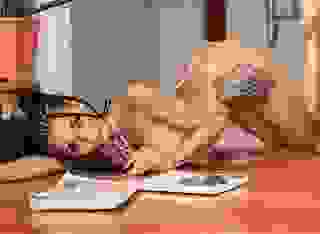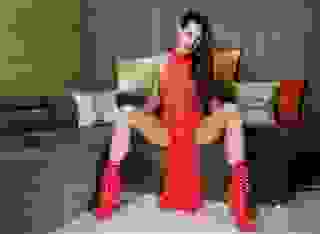Note: You can change font size, font face, and turn on dark mode by clicking the "A" icon tab in the Story Info Box.
You can temporarily switch back to a Classic Literotica® experience during our ongoing public Beta testing. Please consider leaving feedback on issues you experience or suggest improvements.
Click here"5-0-5, got it." He turned to McMasters. "Time to get the fuck out of Dodge, Amigo," and they had just started down the tree when they heard the huge Sikorsky beating up the valley. Asher took out a green smoke grenade and tossed it through the trees, watched the lime colored smoke rise through the trees into the twilight.
"5-0-5, he's got you, so -- uh, stand by one."
Asher heard it first...
Jet aircraft approaching...
"Okay, 5-0-5, some Migs inbound, CAP overhead moving down to engage, this is going to be a hot extraction."
Then they heard small arms fire, behind the ridge-line.
"Red Dog, we've got company coming, other side of the ridge."
The Sikorsky CH-3E appeared overhead, it's final approach unheard when mortar fire started landing on the hillside, and the heavy jungle penetrator landed with a grating thud a few feet from Asher.
"Get on," he yelled, pushing his BN into the webbing. He shot a thumbs-up the airman watching above and McMasters disappeared through the trees -- and Migs roared by, spraying the hillside with machine gun fire.
Asher saw troops moving through the woods a hundred yards away, then took off -- running down the hill into the safety of the fires raging after napalm ignited the forest below.
+++++
Bao watched the rescue operation unfold from a hilltop five miles away, staggered that the Americans had staged an operation this far north, and furious that this pilot had now caused such a large additional loss of life. He watched one airman hoisted into the so-called Jolly Green Giant, then he saw it taking fire. He watched as it abandoned the attempt to lift the second airman aboard and turn south, then he watched as a US Navy Phantom shot down one Mig, then another, and he only grew more determined to get this pilot, whoever the hell he was, and bring him to justice.
+++++
Alone now, in the middle of the night, and suddenly cut off from his supplies, he circled back to his tree and watched the area for a while, then, just before dawn he climbed back into his hammock redoubt and promptly fell asleep. McMasters had left his food and water and, more importantly, his spare radio batteries behind, and he gathered these belongings during the afternoon and made an inventory. He figured, with real care, he had enough food and water on hand to get by for three weeks. He had three extra magazines for his Colt 1911, and an extra K-Bar knife, too, and as the sun set he considered taking off on foot -- but decided to stay put one more night.
He heard trucks and men on foot all through the night, and he watched as they reloaded into the trucks again the next morning, and drove off.
Again, he considered leaving but decided to hold fast to his tree one more day, and his decision was vindicated. He saw more troops walking the hillside during the night, even using flashlights as diversions, trying to flush him out.
He packed his gear the next morning and took off down the hill, moving quietly between two converging formations, then he slipped across the road and quickly ascended the hill on the other side of the valley -- and he never looked back as he crossed open land, moving west now very quickly. He stopped near a farm at midday, tried the radio but got no reply, and only static that night.
He was on his own now, he knew.
There was no fence, no border to mark when he crossed into Laos, and he kept pushing west. He came to a small river and swam across, picked leeches off his legs and chest on the far side, and still he pushed west. Days passed quickly now, and one evening he entered a dense forest, but soon he came upon a paved road. A very elegant paved road, with low bollards casting pools of light at regular intervals up the pavement.
Keeping to the shadows, he followed the road up a hill until he came upon a house in a clearing, and he saw an old Rolls Royce out front, gleaming in the night under several spotlights. Moving through brush, he approached the house, circled behind to the rear -- and there he staggered to a halt.
He saw a swimming pool, large, elegant, the water lighted, and he saw two women in the water. Naked women. One a blond, the other a redhead, and they were staring at him.
Then he heard a man's voice, the accent English.
"Well, come on, then," the man said, "you might as well come on in, get out of those clothes. Dinner will be on in a bit, but I suppose you'll want to shower first."
Asher turned around, saw an older man standing in the shadows, a Walther PPK in his right hand, pointing right at his face.
"Yes, well," the man continued, "we've been expecting you, after all." He lowered the Walther and stepped forward, holding out his right hand. "The name's Bond. James Bond," the man said, then he started laughing.
And Asher, the wound on his leg severely infected after crossing the river, simply fell to the ground in fevered delirium.
+++++
He woke in the middle of the dream, tried to stand but found he couldn't move, that his wrists and ankles had been tied to a bed of some sort. He felt something between his legs and lifted his head, and he saw a bright light -- and a man -- a surgeon, perhaps -- suturing his thigh.
And the Englishman. He was still standing -- in the shadows -- looking on.
"Ah, you're still with us," the old man said, walking over to the side of the bed.
"Where the hell am I?" Asher said.
"The easy answer, old boy, is here, at my home, and let's keep it easy for now, right?"
"Am I in Laos?"
"Oh yes. You've made it this far, farther than I suspected you might, in fact. The Pathet Lao are turning over every bush looking for you, too."
"What? Why?"
"You've caused quite a stir, old boy. Dropping a bomb on that hospital and all, half the goons in Southeast Asia are out looking for you."
"What? What hospital?"
"Hanoi. Apparently your group bombed an airbase there, but it seems a stray bomb landed on a hospital. A rather large hospital, as it happened. Killed about 800 people, women and children mainly. Jane Fonda is outraged, by the way, you might like to know."
"What?"
"There's a reward out for you, and Sheriff Bao and his posse are still looking for you, I'm afraid."
"Look, I'm sorry, but this isn't making any sense to me, at all."
"Well, I'm not surprised. You're running a fever, 1-0-2, or so the good doctor tells me. And as soon as we get this leg on the mend, you and I will have to have a little talk, but it's frightfully late and I'm very hungry, so if you'll excuse me now..."
Asher tried to speak but put his head down, winced as the doctor continued suturing his thigh, then thought better of it and fell asleep -- again.
+++++
He felt the sun streaming through an open window, opened his eyes and saw draperies fluttering in a gentle breeze, then smelled bacon frying and coffee brewing.
He sat up, tried to understand why he wasn't swaying in his hammock, and why he was in a room that looked like it belonged in a Doris Day movie -- then realized he needed to go and wondered where the bathroom was. "It should be right there," he said out loud, and he walked over to a door. "Voila!" he said, stumbling into the bathroom. He looked at his reflection in the mirror, saw dried mud etched into his skin and looked at the shower -- blood red tile, deep red grout, what's going on here? -- then turned on the water, waited for it to warm. He stepped in and moaned, then jumped out.
"Oh, the doctor advised you not get his knitting wet for a day or so," the old Englishman said from to doorway. "Here's some plastic wrap. You might put some over the wound." Asher stood halfway behind the wall, caught the box as it tumbled through the air.
"Right. Thanks."
When he finished his shower, he went out into the room and found his clothes gone, even his flight boots and gloves, and the only thing even remotely suitable was a white terry robe -- replete with logo -- the robe obviously stolen from the Peninsula Hotel in Hong Kong. He put it on and walked out of the room, and into some kind of fairyland.
Red everywhere. Blood red walls, a darker red on the floor, a tight Berber carpet, he saw, yet deep red. Black and green floral upholsteries, with deep red trim, and then, in the kitchen, red appliances and red slate countertops, and then, the old Englishman, standing at the stove working on the bacon, in khakis and a red shirt.
"Ah, there you are? Feeling clean, are we?"
"Yes. Thanks."
And two girls bounced into the living room, the blond and the redhead. Perhaps mid-twenties, still naked -- and he looked at them, found he couldn't take his eyes off either of them.
"Stacy! Becky! Clothes on around guests! Off with you, now!"
The girls pouted and made mewing noises during their retreat, and Asher shook his head, tried to push away the stiffness he felt growing under the robe.
"I suppose I'm used to it by now," the old man said, "but it just wouldn't do to have you sitting around having breakfast with an erection, would it?"
"I don't suppose you'd care to tell me who you are, where I am? Anything like that would be appreciated."
"Hmm, yes. Well, help me get the food on the table, wot?" He handed two plates to Asher, who carried them to an ornately set table in a dining room that overlooked the pool -- and the jungle beyond -- and he remembered the well-kept driveway, the manicured lawns he'd stumbled on in the night.
The old man carried three more plates to the table and the girls came back in -- wearing red lingerie, complete with bright red slip-on high heels.
"Well, that's not exactly what I had in mind," the old man sighed, turning to Asher. "We don't have many guests here, as you might imagine. I suppose they're hungry."
"Hungry?" Asher said. "You mean, like cannibals, maybe?"
"What?" the old man said, then he laughed a little. "Yes, just so. So, dig in, as your countrymen are fond of saying. It's American bacon, too, by the by. Get it from Danang."
Asher did in fact dig in, though he ate as slowly as he could, savoring every bite, but the tabletop had little glass inserts set in the wood, and all he could see was the redhead's legs. He crossed his own, tried to concentrate on his toast and jam.
"So, I think you were still a bit groggy last nite, but the North Vietnamese and the Pathet Lao are looking for you. There's a Colonel Bao leading the charge, so to speak; you apparently killed his wife, among others, when one of your bombs hit the hospital where his wife was working."
"Excuse me, but how do you know all this?"
"Oh, the BBC world service. Shortwave radio, old boy."
"I see."
"And I, well, I have contacts in the local military, the resistance, as well. They keep me well informed. Given where your aircraft came down I assumed the possibility existed you might make it here, too."
Asher sat up when he heard that. "If you did, I take it this Colonel Bao might too?"
"Oh, he has, he has. But not to worry, you're quite safe."
"Why?" Asher sighed. "Why -- what do you have that's so important?"
"Me? Oh, I run one of the largest opium distribution and processing networks in the Golden Triangle, my boy. Have for years and years. How are your eggs, by the way?"
+++++
Colonel Bao, still in his Mi-8 helicopter, circled the compound and watched the pilot line up to land, and moments later he saw an American Jeep, an old WWII model, come down from the house on the hilltop. The old man himself, Clive Martin, was behind the wheel, the American sitting by his side. Bao clinched his teeth in anger, felt for the Makerov in his holster and tried to restrain the murderous impulse threatening to overwhelm his senses -- but with little success.
The helicopter settled on the ramp, and Bao sneered at the drug-runner's vast array of aircraft. The transports and the Lear Jet, all the trappings of capitalism run amok, and he wanted to kill this round-eye, too. Right here, right now -- both of them, they were symbols of everything wrong with this world, now coddled by the rebels, his supposed allies. The money this vile creature generated financed the rebels' war with the royalists which, like his own people's struggle, was nothing more than a larger struggle between two competing sets of ludicrous European ideologies.
'This is madness,' he heard an inner voice whisper. 'You must resist this madness, in all it's forms.'
'Means and ends,' another voice sighed, pulling him back to his anger. 'People everywhere have to come together to solve problems. War is necessary to achieve that end,' the voice said, and he believed this one, too. Pulled in so many ways, now his only link to sanity done, her body charred, laying in the bottom of a molten crater.
But he took his hand off the pistol, decided to listen to what the old Englishman had to say. For now, anyway.
The gunner opened the door and Bao hopped down to the concrete, walked over to the Jeep. The American looked like a preening cat, he thought, sitting in the sun, licking it's wounds -- yet he saw the molten rubble of the hospital in the American's eyes, his wife entombed by the seeping flow -- and he struggled to contain his fury for a while longer.
The 'round-eyes' got out of the Jeep and came to him; he saw the American was still armed -- and he smiled as hot lust blooded his eyes. 'Yes, I will kill this man,' he sighed inwardly, smiling as he turned away from the Gate.
"Ah, lieutenant, may I introduce you to my good friend, Colonel Vo Nguyen Bao. Colonel, my new friend, Lieutenant Benjamin Carter Asher, of the United States Navy."
He looked down as this barbarian held out his hand, and he scowled -- then took the man's hand in his own. "Lieutenant," he said, bowing his head slightly.
And when the barbarian nodded his head he saw sorrow in the man's eyes. Understanding, and sorrow. 'How odd,' he thought. 'I did not expect this.'
"I think some tea would be good, Colonel. Would that be of interest?"
"Yes," he said, wondering why anyone would drink tea in this heat. "Thank you, my friend."
The American gave up his seat, hopped in the back of the Jeep, and Martin drove up the hill, but he passed the opulent house and parked by a wooden wall. They got out and walked through a concealed gate, and into a magnificent Japanese garden. Bao sucked in his breath, had never seen such harmony, and he stared in wonder, lost to the reality that such a place could exist in this jungle, then they walked along a raked gravel path, over a little wooden bridge to a tea house that seemed to float above a pond.
They took off their shoes and went inside, and he saw an old woman sitting on her heels, her head bowed. Japanese? he wondered, then Martin sat, bid him and the lieutenant to join him on the tatami.
Then the old woman poured tea and left.
"So, lieutenant," Bao said after he took a sip. "Tell me about your mission?"
And Asher told him. About the Migs, about their approach through the storm, the actual bomb-run, then the hung bomb after the release, trying to trim the aircraft and losing control, the SAMs passing overhead, slamming into the building on the hillside just ahead, the bomb releasing, regaining control then passing through falling debris, his aircraft now damaged, the struggle for control...
"The air defense missiles?" Bao asked, focused now. "You say they hit a building? Can you describe it -- the building, I mean?"
"Yes, large, made of brick, dark brick. The first missile hit and I couldn't believe the size of the explosion."
"It is a new, Soviet-made high-explosive," Bao said, shuddering inside. "Very powerful."
"The second hit moments later. Debris from the building fell on my aircraft; that's when we began to lose control."
"Karma," the old Englishman said.
"You did well," Bao said, his eyes filling with sudden tears, "to make it as far as you did."
"Are you a pilot, Colonel?"
"Yes. I understand now."
"I understand you lost your wife. I'm sorry for your loss."
'Are you?' Really?' he wondered, but yes, he could see it in the American's eyes.
"Thank you," he said. "Nothing good comes from misunderstanding."
"War is the greatest misunderstanding, I think," Martin sighed. "So much life wasted. So much time."
"Did you fly, in the war I mean," Asher asked Martin.
"Yes, in Burma. Light bombers. I was shot down, managed to land in a clearing, walked out and ended up in Bhutan. That was late in '44. Ended the war in a monastery."
"A monastery?" Bao asked. "How do you mean -- ended?"
"Oh, it's not important, but I came to this valley, you see," yet Bao could see it in the Englishman's eyes. They had now stumbled upon the most important moment of Martin's life. "I came upon a bhikkhu, a monk, and I was sick. He helped me into the mountains, to his monastery, and they cared for me. I have never in my life felt so content, so at peace with myself."
"I would like to find this place," Bao said, "someday. I have never been content, have not experienced contentedness. I wonder now if it even exists."
"Oh, it does."
"I feel content," Asher said, "when I'm in the air."
"Yes," Bao said, "that is a contented moment. I used to feel that way, too."
Martin looked at the exchange and smiled inside. Nothing like common ground, he sighed. "More tea, Colonel?"
+++++
They ate sandwiches later, in the main house, simple things of cucumber and herbs, and Bao looked at the pool and the gardens and wondered why this man had turned to evil to build his dreams. His actions tore down reality, burned it to the ground, carried relentless waves of pain and suffering to the innocent, then he considered that, perhaps, in some cases you had to accept hate before you could understand love. Then he looked inside, considered another impossibility. Why had he wanted to kill this American, without really knowing all the facts? Why did he want to fight an endless war, over the imposition of an ideology he really found childlike, almost idiotic. Wasn't he evil, too? How many lives had he ended. How many dead sacrificed on the altar of need, how many ends from dubious means.
Then he heard the American again.
"I'd like to see this place, this monastery."
"I would, as well," Bao said abruptly -- and the words surprised him, and Martin, as well.
"Indeed," the old Englishman said. "Colonel, that surprises me."
"Does it, old friend? I wonder why?"
"You come from a Buddhist tradition..."
"No. I come from a communist tradition."
"Ah. You replaced one religion with another."
And Bao nodded his head. "Man always seeks order, does he not? Out of chaos? When man grows blind to such things, one God is as powerful as the other."
And Martin smiled. "But what if all such order is an illusion? What then?"
"Then all life is an illusion."
And with his hands steepled under his chin, Martin looked at Bao. "Is it, now? How interesting." The two looked at one another for the longest time, then Martin leaned back, looked at the ceiling for a moment. "I suppose we could go up for a little ride today. Play among the clouds for a while. What do you think, Colonel?"
"Yes. It would be good to feel the sky again."
+++++
Asher walked around the aircraft, clearly perplexed. "You sure it will fly," he asked Martin.
"Oh, yes. I took it up last week. Tested the new engine. It's all good."
'It' was a Pilatus PC6 Porter, it's Air America 'N' registry freshly scrubbed away, the once bare metal fuselage freshly painted in mottled grays. Patched bullet holes were still evident under the paint, and welds to reinforce damaged struts on the left wing stood out like livid wounds, still trying to heal.
"So, you can fly this thing?"
"Oh, yes. The engine procedures may be a little more complicated, but she flies like an old Cub."
"I've heard about these things," Asher said, "but this is the first one I've seen."








